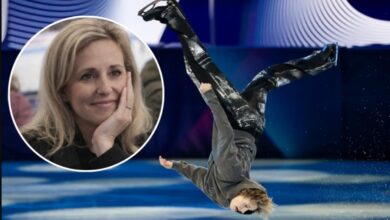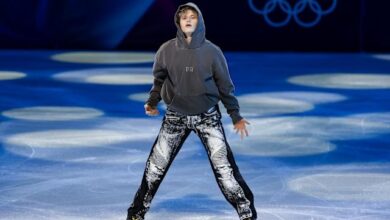When Lightning Struck: Metallica’s Epic Munich Storm Show Becomes Rock Legend
On May 24, 2024, Metallica launched the European leg of their M72 World Tour at Munich’s Olympiastadion—and Mother Nature decided to join in. As the first crushing riff of “Master of Puppets” thundered out, a torrential downpour erupted, soaking the band and tens of thousands of diehard fans. The moment felt ripped from a rock fable—rain, lights, and raw power, all colliding in one electrifying scene.
The timing couldn’t have been more cinematic. Just as James Hetfield unleashed the iconic riff, a bolt of lightning shot across the sky above the stage, leaving the crowd in awe. It was the kind of spontaneous moment that becomes instant legend—a challenge you simply ride out and remember. Metallica, of course, rose to the occasion.
What many didn’t realize was that Hetfield’s guitar that night was no ordinary instrument. In his hands was “Carl,” a custom Explorer crafted from wood salvaged from the original garage in El Cerrito, California, where Metallica first forged their sound. That garage was the birthplace of “Master of Puppets,” “Ride the Lightning,” and so many foundational tracks.
Despite the relentless rain, “Carl” kept singing. Hetfield, drenched but undeterred, let the guitar’s history echo through every chord. Made from the beams of 3132 Carlson Boulevard—the place where Metallica’s identity took shape—the instrument carried not just notes, but decades of memories.
Fans and onlookers were stunned to see Hetfield wield such a cherished piece of the band’s past in the middle of a downpour. The soaked body, dripping strings, and rain-streaked wood turned a great show into an unforgettable spectacle. This was far from a routine gig.
Social media erupted. Fans called it “metal as hell,” with others insisting, “This needs to go down in history,” and some joking, “Lightning strikes? That’s Cliff Burton giving his blessing.” The moment’s intensity was only magnified by the elements.
From a technical standpoint, “Carl” was built to endure. Outfitted with sealed electronics and rugged EMG pickups, it withstood the storm, delivering flawless sound despite the chaos on stage. This wasn’t just sentimental showmanship—it was a triumph of craftsmanship and grit.
Drummer Lars Ulrich later admitted that no one expected the night to get so dramatic, but when the storm hit, stopping wasn’t an option. The energy of the crowd, combined with the unique circular stage, made retreat impossible. Metallica met the moment head-on and owned it.
While the setlist was packed with classics, it was the rain-soaked, unbreakable delivery of “Master of Puppets” that became the show’s defining memory. Images of Hetfield—guitar slung low, rain streaming down—became some of the tour’s most iconic visuals.
One viral TikTok alone racked up over 800,000 likes in days, capturing Hetfield in the rain, spitting lyrics into the mic with “Carl” roaring at his side. It wasn’t staged or contrived; it was pure, unfiltered metal.
Critics and fans alike hailed it as one of Metallica’s most unforgettable recent performances. What made it legendary wasn’t just the music—it was the resolve. There were no theatrics, no hiding from the elements. Just four musicians battling the storm, as they always have.
Fans recounted the experience as a once-in-a-lifetime moment. “I was there,” one wrote. “It was like witnessing history. The band, the rain, that song, that guitar—it felt mythic.” In a long career of iconic concerts, Munich earned its place among Metallica’s greatest.
And at the heart of it all was “Carl,” the guitar built from the same garage that saw Metallica’s beginnings, now sharing the stage with them in a stadium alive with lightning and applause.
That night, Hetfield didn’t just play “Master of Puppets”—he breathed new life into its spirit. Soaked and defiant, with “Carl” wailing beneath the Munich sky, Metallica proved once again that their legacy is alive, fierce, and still writing new chapters.
For everyone lucky enough to witness it, Metallica’s storm-drenched Munich concert was more than a show—it was a testament to resilience, heritage, and the magic that happens when legends refuse to back down from a challenge.





